- Home
- Peter Swanson
Her Every Fear Page 13
Her Every Fear Read online
Page 13
“Don’t worry about it. It’s not my cigarette, it’s our cigarette.”
“I don’t even smoke. I think I’m just stoned.”
“Dude, I know,” Henry said and started to laugh. Corbin joined him, their laughter mixing with the perpetual squawk of gulls.
It was ten months later when they found a candidate. Her name was Linda Alcheri, and Henry had met her in Hartford when he moved there after graduation from Aurelius College. Corbin was back in New York City, where he’d been offered an entry-level job at Briar-Crane.
“Thing about her,” Henry said on the phone, “was that she started telling me how much she loved me about a week after we started seeing each other. It’s bullshit, though, I know it. For one, she started saying it the night I took her to a really expensive restaurant. Not a coincidence, I’d say.”
“Doesn’t mean she’s being unfaithful.”
“Oh, I think she’d hook up with anyone if she thought there was something in it for her. I think she’d take one look at the way you wear a Brooks Brothers shirt and drop me like a hot potato.”
So, Corbin came up during a weekend when Linda Alcheri was throwing herself a birthday party at her apartment. Linda lived in a complex in West Hartford, and the party was taking place on a shared roof deck. Henry begged off early, but Corbin stayed late into the night, until only he and Linda were left. “How are you getting back to Hank’s house?” she asked Corbin. She had to put one of her hands against the railing of the roof deck in order to stay standing.
“You call him Hank?”
“Don’t you?”
“No, I call him Henry.”
“Henry. Hank. Whatever. Where is he, anyhow?” She looked around as though he might still be somewhere on the roof.
Corbin walked her to the bedroom, Linda leaning heavily against him. “Thank you, Corbin,” she said, and gave him a sloppy kiss on the side of his mouth. She entered the room and shut the door behind her. Corbin called Henry on his cell.
“So?” Henry asked.
“She kissed me good night, and now she’s passed out in her bedroom.”
“What kind of kiss?”
“Pretty innocent.”
“You should go crawl into bed with her, see what happens.”
“She’s pretty drunk.”
“Exactly.”
“Nah, man. Come and get me.”
“I’ll come early in the morning. Sleep on her couch.”
Corbin stripped to his boxers and lay on the couch under a fleece blanket. He never slept particularly well, and drinking too much made it worse instead of better. He lay awake, staring at the ceiling of the old apartment. There was glitter in the textured stucco. He worried a little about Henry’s plan to kill again, but he worried more about losing Henry’s friendship. The few times he’d expressed reservations about their plan Henry had looked so disappointed.
“It’s who we are, Corbs,” Henry had said. That was during the winter break, when they’d spent a long weekend skiing at Sunday River. “Besides, how much time do you spend worrying about what happened to Claire Brennan?”
“I don’t,” Corbin said. It wasn’t true. He did think of Claire, but not as often as he used to, and when he did think of her, he reminded himself that Claire had brought him together with Henry. Claire had given him that one thing. A best friend.
“Exactly,” Henry said. “We’ll pick someone else like Claire, someone the world will hardly miss. It’ll be like stepping on a bug.”
Just as the sky outside was getting light, Corbin felt his eyes grow heavy. He closed them, twisting onto his side, and was about to slide into sleep when the sound of bare footsteps on the parquet floor woke him up. Linda was standing above him, wearing an old Whalers jersey that hung halfway to her hips and nothing else. She took Corbin by the hand and led him back into her bedroom. “You’re shivering,” she said, when they were under the sheets together.
“Why don’t you warm me up?” Corbin answered, knowing that her fate was now sealed.
Two weeks later, Henry lured Linda to an abandoned Boy Scout camp on a swampy pond forty-five minutes west of Hartford, telling her he was bringing her to a friend’s luxurious cabin. Corbin was waiting there, posed as before, like he’d been stabbed to death. It felt so similar to being in the cemetery in London, but it also felt completely different. Lying there, the dampness of the ground spreading through his clothes, the fake blood drying along his collarbone, Corbin knew what they were planning, knew that Linda was about to die a painful, scary death, and something close to terror swept through him. It was a cold, paralyzing terror, the kind he used to get as a small child when the lights were turned off, but he couldn’t sleep, and the monsters that hid in the walls began to whisper. He felt light-headed—he hadn’t slept or eaten in the last eighteen hours—and sat up to take a deep breath of the piney air.
Henry and Linda were ten yards away, Henry’s hand on Linda’s arm.
When she saw Corbin sitting up, blood-splattered, she tore away from Henry’s grip and ran, screaming, into the woods. Henry took off after her. And Corbin, once he stood on his weak legs, followed. Maybe it wasn’t too late to tell her it was just an awful joke? But when he caught up to them, Henry had already killed her, using a large sharp-edged stone. “Sorry, man, I think she’s dead,” he said, smiling, looking down at her caved-in skull. Corbin’s skin broke out all over in cool sweat, and for a moment he thought he was going to faint. Henry snapped his fingers. “Dude, you okay?”
“Yeah, man,” he said back. It was done. Linda was dead.
Together, they dragged her body back out of the woods, and Henry sent Corbin back to his SUV to grab the shovel he’d brought.
It was a quarter-mile hike to where Henry had left his vehicle—Corbin telling himself that what they’d done was what made them special, better than the rest of the world—and when he got back to the camp, shovel in hand, he was ready to embrace the ritual act of burying the body. But he was stopped by the sight of Henry standing over Linda’s body, grinning, his hands palms out as though he were presenting a gift. Corbin looked down. Henry had sliced Linda with his knife, a deep cut from her hairline down the center of her face, that continued down her torso, her clothes and skin split open.
Corbin turned, dropped to his knees, and emptied his stomach onto the weed-choked gravel.
“Sorry, man,” Henry said. “I thought you’d like it. Half for you, and half for me. We split everything right down the middle.”
“It’s just . . .” Corbin began but couldn’t finish.
“A little theatrical?” Henry said and laughed.
Corbin looked up. Henry was holding out a pair of rubber gloves, the same flesh-colored style that he was wearing himself. Corbin noticed that he was also wearing a thin ski cap that he hadn’t worn before.
“Let’s bury her and get the fuck out of here,” Corbin said as he took the gloves.
Corbin tried as hard as he could to not look at her while they dug her grave, then rolled her body into it, but that single glance, her skin pulling away from the center of her face, black flies beginning to gather in the bright July sunshine, stayed with him after Henry and he cleared the crime scene and went their separate ways. It stayed with him—permanently burned onto the undersides of his lids—for weeks after that afternoon. Every time he shut his eyes, every time he blinked, there she was. His insomnia got worse, and so did his paranoia. He kept waiting for the police to show up at his door, especially since he’d learned from Henry that Linda Alcheri never knew Henry’s real name. He’d told her it was Hank Bowman, and lied about where he worked and where he was from.
“I gave her my real fucking name at the party,” Corbin said over the phone.
“Dude, she’s not going to tell anyone.”
“She could’ve told one of her friends, written it down somewhere, Jesus . . .”
“Sorry. I should have told you to use a false name. But you just told her ‘Corbin,’ right? Not your last n
ame? You have got to relax.”
“She had friends there who met me.”
“Same with me. We’re in the same boat, but it’s not a bad boat, man. Not at all. They haven’t even found the body yet. It’s going to be like last time. They’ll never connect her to us.”
It turned out that Henry was right.
Like Claire Brennan in London, Linda Alcheri became a well-covered missing-persons case. Her body was discovered in early August, when a group of teenagers caused a small brush fire on Eel River Pond that needed to be put out. But in all the articles and reports that Corbin read, none mentioned Henry Wood, or Hank Bowman, for that matter. And no detective showed up at Corbin’s door in New York. They’d gotten away with it again, even though that fact did little to alleviate the fist-sized knot in Corbin’s stomach. It had been different with Linda—so different from when they killed Claire. With Claire, Corbin had been propelled by her wrongdoing and his enormous rage. She knew how much he’d been in love with her, and she let him believe she might feel the same way. And they hadn’t even planned on killing her. It had just happened, and it only happened because Claire had smiled at him. That half smile of pity directed toward Corbin.
No, with Linda it had been something else. Premeditated, for one. And more like a sick, twisted game. Corbin began to wonder if Henry had ever really been that involved with Linda in the first place. He’d said they were, but maybe he had lied.
Corbin kept thinking back to the night of the party, to the way that Linda had acted toward Henry before he’d left the roof deck. She’d seemed glad to see him, giving him a kiss when he arrived, but she hadn’t acted clingy, or even particularly affectionate toward him. She’d flitted around with her other guests. Maybe Henry was just someone she was hooking up with, a casual thing. And if that were the case, then what she did with Corbin that night wasn’t straight-out cheating. Henry had rigged it, lying to Corbin about the extent of his relationship. Or had he?
With obsessive regularity, Corbin struggled to remember all the details that had led to Linda’s death. He tried to remember what had happened after she woke him from the couch, then pulled him with her into the bedroom.
“I hate sleeping alone,” she’d said. “Does that make me a slut?”
Corbin remembered the strong smell of alcohol coming from her pores, how she’d reached down and touched him, then told him maybe they could just cuddle.
“What about Henry? Hank, I mean.”
“Oh,” she’d said, sounding a little surprised to be asked the question. “He’ll be okay.”
“She was the life of the party, that’s for sure” was what a lot of her friends said about Linda Alcheri after the body had been found. That was the most common quote. There was never any mention of a boyfriend.
The more Corbin thought about it, the more he realized that Henry had desperately wanted them to kill again, to replay the events in London, and he’d made it happen, lying to Corbin, making sure he spent the night with a girl who probably slept with everyone. It had been an entirely different situation than what had happened with Claire.
He’d planned everything, even knowing ahead what he was going to do to Linda’s face after she was dead.
Maybe Henry had planned the murder of Claire in London, as well?
He suggested they bring the knife and the shovel to the cemetery?
But the knife and shovel were there for a reason, Corbin told himself. They were there to fool Claire into thinking that Henry had killed Corbin.
Why had that knife been so sharp?
No, Corbin thought. Henry hadn’t planned on it all, because it was Corbin who had started it, who shoved Claire, then banged her head against the ground.
Still, in midsummer, after a night of drinking, Corbin called Henry on his cell phone.
“Hey, man. Great to hear from you,” Henry said.
“We’re done,” Corbin said. “It’s done. I don’t want to do it anymore.”
“Okay. Relax. What are we talking about?”
“You know what we’re talking about.”
There was a pause. The air-conditioning in Corbin’s Midtown one-bedroom clicked on and began to hum. “Dude, let’s not have this conversation over the phone, okay?” Henry said.
“The conversation’s over. You know what I’m talking about, and I don’t want to be part of it anymore.”
“Fine. I hear you. We’ll, uh, not find any more girls to play with.”
“And I don’t think we should hang out together anymore. It’s risky, and . . .”
Henry was quiet.
“You there?” Corbin asked.
“Yeah, I’m here. I’m trying to understand what it is that you just said.”
“I think . . . I think, for now, at least, we are no longer friends. I don’t want to be your friend.”
“Whatever the fuck you want, man. I hear you, but keep your head, buddy. Don’t forget about the Polaroids.” Henry’s voice was different. Calm, almost.
Corbin ended the call. His palms were sweaty and he wiped them on his shirt.
He hoped he’d never hear from Henry again.
And he didn’t, not for a long time. Not until after he’d met Rachael Chess.
Chapter 16
Corbin would never have met Rachael if he hadn’t decided, shortly after his father died, that he needed to have a better relationship with his mother and his brother. They were both planning on spending the months of July and August at the New Essex house on the North Shore of Massachusetts, and Corbin, now living in his father’s apartment in Boston, asked if he could join them for two weeks.
His brother Philip’s response: “Dibs on the front bedroom, Corbin. I always stay there now.”
His mother’s: “I thought you hated the New Essex house. There’s greenheads on the beach, remember?”
He’d gone anyway. The day he arrived he knew it had been a mistake. Philip had taken the boat out—in a transparent attempt to avoid Corbin’s arrival—and while his mother had made an attempt at civility, he caught her looking at him in a mirror while she mixed gin and tonics. She wore an expression of visible disgust, her wrinkled mouth turned down at the corners, translucent nostrils slightly flared. She’d never loved him. He’d known this from a very young age, and accepted it the way that children will always accept the rules of their universe. As he got older, he realized that his mother despised him because he reminded her of her husband, and that she loved Philip because he reminded her of herself. One of the reasons that Corbin wanted to visit his mother after the death of his father was to see if she’d softened at all, if her attitude had changed. It hadn’t. He felt it immediately, and in a strange way it comforted him. If his mother had become affectionate, the way she was with Philip, well, the thought of that almost made him physically sick.
He stayed for the two weeks, anyway, determined to enjoy the house, with its views of the Atlantic, and spend as little time with his family as possible. On his second night in New Essex, he ate dinner at the Rusty Scupper—a bar and grill walking distance from his mother’s house—and that was where he met Rachael Chess. She was escaping from her family as well, having just begun her annual two-week stay at their year-round house just off the town beach in the southern part of town. He walked her home, and they sat talking on her front porch for hours. He told her about the recent death of his father and the awful members of his remaining family, and she told him how she’d been sleeping with one of her teachers, a married man, at the nursing school she was attending.
By sunrise, they were kissing, and they’d agreed to a two-week fling, no strings attached. He walked home along the beach in the milky light of dawn and felt a strange sense of calm, as though the world were shifting in his favor.
He and Rachael had made plans to meet for lunch the next day, and when she was late, he wondered if he’d dreamt her. But she showed up, and they spent almost every moment of the next two weeks together. Rachael was an open book, telling Corbin intimate details
from her complicated life. Corbin, in turn, told her about the way his mother had paraded her sexual affairs in front of his father, and Philip and him, for years before his father finally left. He even told her about some of his own sexual problems during college; she was sympathetic without being pitying, and Corbin found himself desperately wanting to tell her what had happened with Claire in London, and then with Linda Alcheri in Connecticut. He knew that he couldn’t, of course, but it was the first time he had ever wanted to talk about those events with another person. And because Claire and Linda were on his mind, he suddenly found himself plagued with terrible dreams, conflations of the two murders he’d committed, mixed in with images of chasing Rachael along the beach, a buck knife in his hand. At the end of the two weeks, when both Rachael and he returned to their normal lives, he felt heartsick but relieved.
Two months later, Rachael texted Corbin to tell him she was going to be back at her parents’ house over Columbus Day weekend, and did he want to come up. He told her he’d be away for work—the truth, since he was going on a company retreat to the Cayman Islands. But even if he wasn’t going to be away, he wasn’t sure he wanted to see Rachael again. He remembered the dreams.
When Corbin returned from the retreat, he found out, while watching the local news, that Rachael Chess had been murdered, her body discovered in the dune grass by a beachcomber on Monday morning.
Corbin called in sick to work for a week, not leaving the apartment in Beacon Hill that his father had left to him. His boss had joked that the Caymans had done him in. Corbin didn’t let on that he’d known the girl on the North Shore who’d been killed, even though the police had taken a statement, having found out from one of Rachael’s friends that she and Corbin had been involved. An officer had interviewed him over the phone, then presumably checked his alibi through the Briar-Crane offices. Corbin said they’d had a casual fling and that they’d had minimal contact since.
He didn’t tell them that he knew who had killed Rachael Chess. She’d been killed by Henry, of course, sending Corbin a clear message. He knew this with a certainty, even before the police released the information that Rachael Chess had postmortem wounds. They didn’t specify what they were, but Corbin knew: Rachael had a single, deep cut down her middle, same as Linda Alcheri.

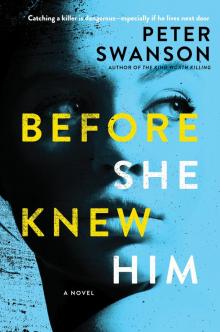 Before She Knew Him
Before She Knew Him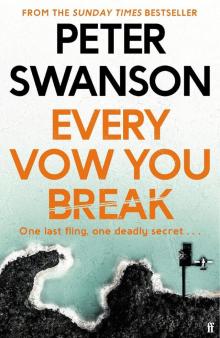 Every Vow You Break
Every Vow You Break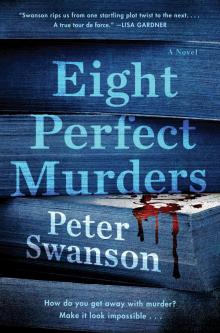 Eight Perfect Murders
Eight Perfect Murders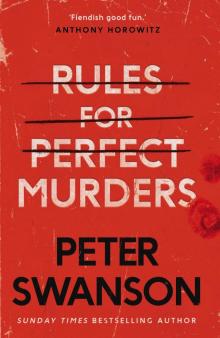 Rules for Perfect Murders
Rules for Perfect Murders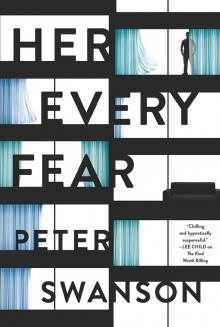 Her Every Fear
Her Every Fear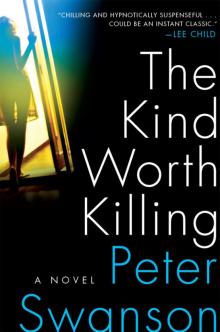 The Kind Worth Killing
The Kind Worth Killing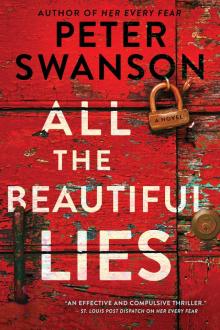 All the Beautiful Lies
All the Beautiful Lies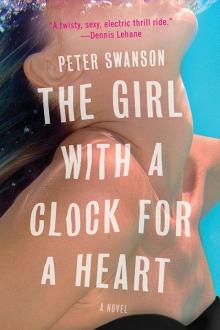 The Girl with a Clock for a Heart: A Novel
The Girl with a Clock for a Heart: A Novel